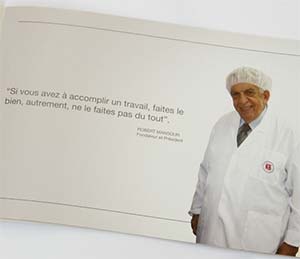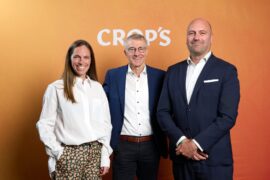Robert G. Mansour, founder of the Givrex vegetable and fruit processing company and a trailblazer in Egypt’s frozen food industry with the distinction of being the first to register a business enterprise in that sector, died on July 22, 2018, at his home in Alexandria after battling an extended illness. He was 88 years old.
Though relinquishing the helm as president a number of years ago, he remained a steadfast source of inspiration for the family-owned and operated enterprise until the end.
 Funeral services were held on July 23, before Mr. Mansour was laid to rest at the Melkite Greek Catholic Tombs in Alexandria. Immediate surviving family members in attendance were his wife for 58 years, Madeleine; daughter Monique; sons Patrick and Eric; and grandchildren Chantal, Sandra, Carol and Adam. Many friends, employees and business associates were also at the ceremony to pay last respects.
Funeral services were held on July 23, before Mr. Mansour was laid to rest at the Melkite Greek Catholic Tombs in Alexandria. Immediate surviving family members in attendance were his wife for 58 years, Madeleine; daughter Monique; sons Patrick and Eric; and grandchildren Chantal, Sandra, Carol and Adam. Many friends, employees and business associates were also at the ceremony to pay last respects.
While best known for the success of the Givrex brand created by Robert Mansour & Co. in 1978, the entrepreneur’s commercial roots were actually in the marine products sector.
As a young man he seized an opportunity in the seafood industry during the 1950s, specializing in the export of frozen shrimp to the Migros supermarket chain in Switzerland and to other retail and foodservice distributors in Europe and beyond. In those days the Mediterranean waters off the coast of Egypt were especially rich in resources. Landings were plentiful, with six to eight tons of shrimp coming to port each day.
Mr. Mansour’s flourishing business was temporarily interrupted during the Suez Crisis in 1956, when he patriotically answered his country’s call to arms and served as a tank commander in the Egyptian Army. Deployed to repel attacking enemy forces, he led an armored unit into battle to support the nation’s resistance to foreign military invasion.
After the war, he wasted no time in resuming commercial activities. However, unintended human events turned the tide against the shrimp trade, as the rise of the Aswan High Dam in the 1960s precipitated the decline of the shrimp business. Its monumental construction reduced the natural flow of the Nile River’s stream of rich nutrients into the sea by an estimated 50% or more. This led to a large drop in growth of phytoplankton, the primary food source for fish and shrimp. The effect was catastrophic, with shrimp fishery yields plummeting dramatically.
This was a big setback, along with the fact that the Egyptian government nationalized Mr. Mansour’s companies twice – first in 1961, and again in 1963 when ownership of his Fishlex enterprise was seized by the state. But there were other places to get shrimps, and the determined entrepreneur knew where to go to find them.
Having established a solid export clientele, but lacking product to sell, he packed his bags and headed to Senegal to procure raw material sourced from the Atlantic Ocean. Upon achieving success in relatively short order, he returned to Alexandria to fetch his wife and young daughter for the purpose of relocating the family to a new house near his place of business.
Unfortunately, they never made the trip to the West African nation, as travel visas were impossible to obtain. Domestic and colonial business interests in Senegal seeking to monopolize the seafood trade were not keen on competing on a level playing field with the extremely capable likes of Mr. Mansour, so they blocked his return as well.
Again based in his homeland of Egypt full time and brimming with can-do energy and enthusiasm, he was eager to find a way to get back into the frozen seafood business, which was his first love. But the reunion would have to wait. What came first was a decade of accumulating valuable expertise in the textile industry, via the Cordex company he owned and operated in Alexandria.
Patience and determination paid off in spades later, as his focus on developing Givrex in 1978 initially centered on frozen seafood processing upon receipt of an exclusive license to export fish harvested from Lake Bardawil on the north coast of the Sinai Peninsula. For governmental reasons, however, this license didn’t last for long, which pushed Mr. Mansour to shift gears and enter into a budding frozen vegetables industry. He made contracts with farmers working the fertile green fields of the Nile Delta to supply his upstart processing plant.
“We began small, mainly producing green beans, carrots, spinach and artichokes. Givrex soon became the finest Egyptian company to export frozen artichokes, shipping quantities to Canada and elsewhere,” the president recalled during an interview with an international food business magazine some years ago.
Mr. Mansour’s hard work and impressive results were fully recognized and appreciated within the country’s growing agriculture field and food processing sector. His success provided a blueprint that others would follow in years to come as Egypt’s frozen food industry modernized and steadily advanced, providing thousands of jobs and generating millions of dollars, euros, francs, yen and other foreign exchange to boost the national economy.
From farm to factory and beyond, the founder’s strong work ethic and drive to overcome obstacles positively rubbed off on everybody that he touched. That’s because his genuine desire to help others succeed was thoroughly sincere. Mr. Mansour encouraged suppliers to grow their businesses – not only with words of expert advice, but also with financial assistance. Such gestures of generosity and humanitarianism were abundant.
Factory workers especially appreciated his leadership and hands-on dedication to getting the job done. During a recent visit to a processing plant Mr. Mansour was, as always, warmly received and greeted with cheers and applause.
Today the company’s greatly expanded vegetable product assortment is produced at two state-of-the-art factories. Output ranges from 10 kinds of artichokes (including bottoms, hearts, quarters and cups for stuffing) to okra, spinach, broccoli, cauliflower, sweet corn, grilled eggplant, green beans, peeled broad beans, peas, sweet potatoes, falafel and falafel paste, lentil cream for soups, vegetables for stuffing and much more. Approximately 60% of production volume is exported to customers around the world.
The second generation of leadership at Givrex is fully committed to carrying on in the spirit of the founding father, whose eternal motto was: “If you have to do something, do it well. Otherwise, don’t do it at all.”
Rest in peace, Mr. Mansour, as your company is in good hands. You will be deeply missed as a giant and visionary in the Egyptian frozen food industry, an astute businessman with great humanity and a generous heart, and as a loving father, husband and friend to numerous people near and far. – Reported by John Saulnier





